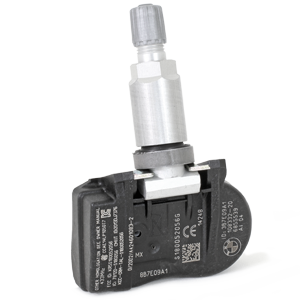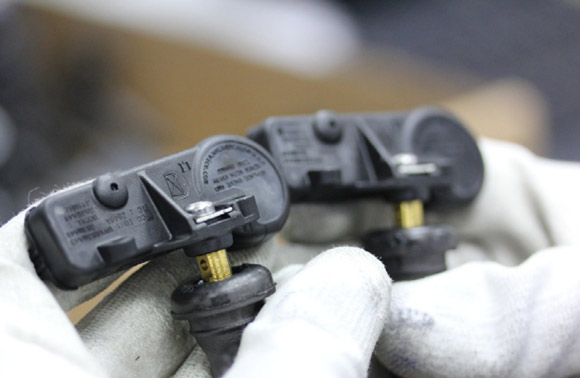
In November 2014, a new European legislation requires all new passenger vehicles sold in Europe to be fitted with a tyre pressure monitoring systems for the road wheels (not the spare). Many vehicles have a simple version of this TPMS already, known as an ‘Indirect’ system - for example some BMW and Volkswagen Group vehicles have a tyre pressure indicator (Measured by the ABS sensors). Both systems constantly monitor and warn of a drop in tyre pressure. The ‘Indirect’ type system is gradually being replaced by a more accurate ‘Direct’ pressure monitoring system whereby each wheel has a tyre pressure sensor mounted to the valve inside all four wheels. This system alerts the driver of a drop in tyre pressure or increase in tyre temperature - maximizing safety, tyre life and fuel economy.
The ‘Direct’ tyre pressure monitoring system uses radio frequency (RF) technology, transmitting live tyre pressures from the sensor in your wheel to your vehicle. If your vehicle was manufactured before January 2012, and it has a ‘Direct’ tyre pressure monitoring system, it is likely that the system was an ordered as an optional extra. There are many systems across the different vehicle manufactures and it is not always easy to understand what to consider when you are thinking of fitting winter wheels and tyres. If you think you have a ‘Direct’ tyre pressure monitoring system (i.e. you can find the tyre pressure data on an in car screen), then these are your options:
1. You can switch the current valves in your wheels to the new wheels and tyres. Seems simple, but you may need to ensure that the valves remain in the same position on your vehicle as in the original wheels. The downside of this option is that you would need to have this done twice per year which would involve rebalancing the wheels and it could easily cost £120-150 per year.
2. You can buy a replacement set of valves (Recommended). New vehicles that may have direct TPMS as standard will have the option to add TPMS valves when configuring your package through our online shop. Prices do vary according to vehicle make and model although you can expect to pay between £70 and £140 for the set of 4 valves inc VAT (much more from your local dealership) our valves will work like your OEM valves. In most cases once the new valves are fitted, the vehicle will detect the change ( after a few miles) and check that you want to store the new valves. You accept the new valaves and that's it! Vehicles manufacturers vary in setup but generally this is the process. We can assist with any queries you have about our TPMS valves on the phone or by email by contacting us. (Note: If your valves were added as an option before the 2014 change, you will need different valves, please contact us.)
3. Some vehicles offer an option to disable the tyre pressure monitoring system. The upside is that there is no additional cost to you, the downside is that you have to identify a flat tyre or an underinflated tyre the old fashioned way (by feel and sound - or a helpful chap on the motorway pointing at one of your tyres and mouthing the news). There are some potential issues in doing this:
a) You should not use this option if you are unable to disable the system (check with your handbook or dealer), as a fault light is a potential MOT fail.
b) You should check with your insurance company before disabling any safety feature on your vehicle.
c) If you intend on using runflat tyres. These days many BMW drivers opt out of using runflat tyres on winter wheels, and choose repair kits or the AA instead. If you do decide to use a runflat tyre, you should not disable your tyre pressure monitoring system. This is because you will have no way of knowing that you have a flat tyre until the tyre completely blows out! So the message here is: If you use runflat tyres - you need the car to tell you when they are flat.
 In any event, this will affect all new vehicles and a second set of valves is more inital outlay, but probably the best long-term option if you want to monitor your tyre pressures. If you can't fit them on your next vehicle, the valves should always have good re-sale value (especially when fitted to wheels). As a company we have researched this area in detail to find the best value solution, and we now offer a comprehensive selection of TPMS valve options at excellent prices.
In any event, this will affect all new vehicles and a second set of valves is more inital outlay, but probably the best long-term option if you want to monitor your tyre pressures. If you can't fit them on your next vehicle, the valves should always have good re-sale value (especially when fitted to wheels). As a company we have researched this area in detail to find the best value solution, and we now offer a comprehensive selection of TPMS valve options at excellent prices.
Please note that we insist on considering this advice along with advice from your dealer and using common sense. If you want to discuss your specific requirements or for more information about your options with TPMS and our products, please contact us.
TPMS FAQ's
1. Do wheels need to be special to accept TPMS valves? - Yes, wheels should be approved for use with TPMS valves (all of our wheels are)
2. How do I know if I have a TPMS? - If you can see your tyre pressures through an in car screen OR check your manual OR contact your dealer. If you just have a funflat indicator light, you probably do not have TPMS.
3. I ordered TPMS as an addon (it wasnt standard) is this ok? - We can source valves for you, but they are probably a different specification from that shown. Basically if your vehicle came standard with TPMS valves from 2014 on our offered valves are suitable, if not call us and we can advise you.
